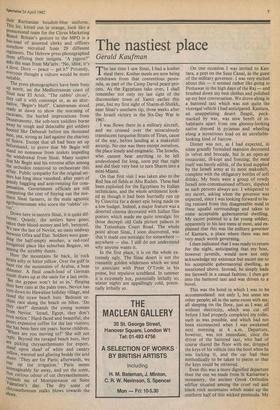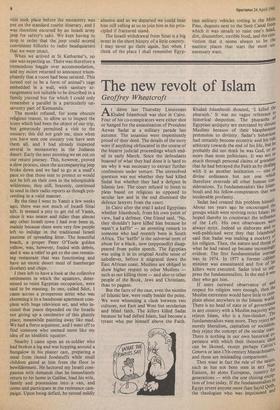The nastiest place
Gerald Kaufman
The last time I saw Sinai, I had a kosher meal there. Kosher meals are now being withdrawn from that contentious penin- sula, as part of the Camp David peace pro- cess. As the Egyptians take over, I shall remember not only my last sight of the disconsolate town of Yamit earlier this year, but my first sight of Sharm-el-Sheikh, near Sinai's southern tip, three weeks after the Israeli victory in the Six-Day War in 1967.
I was flown there in a military aircraft, and we crossed over the miraculously translucent turquoise Straits of Tiran, cause of the war, before landing at a makeshift airstrip. No one was there except ourselves, the place lonely and enigmatic. The Israelis, who cannot bear anything to be left undeveloped for long, soon put that right and did their very best to turn Sharm into a mini-Miami.
On that first visit I was taken also to the Red Sea oil fields at Abu Rudeis. These had been exploited for the Egyptians by Italian technicians, and the whole settlement look- ed as though it had been hurriedly run up by Cinecitta for a desert epic being made on a low budget. Indeed, a major feature was a deserted cinema decorated with Italian film posters which made me quite nostalgic for those decrepit old Gala picture palaces in the Tottenham Court Road. The whole point about Sinai, I soon discovered, was that it made one nostalgic for somewhere anywhere — else. I still do not understand why anyone wants it.
In the first place, it is on the whole ex- tremely ugly. The Sinai desert is not the romantic golden wilderness which we tend to associate with Peter O'Toole in his prime, but repulsive scrubland. In summer it is extremely hot, potentially lethally so; winter nights are appallingly cold, poten- tially lethally so. On one occasion I was invited to Kan- tara, a port on the Suez Canal, as the guest of the military governor. I was very excited about this — it seemed rather like going to Peshawar in the high days of the Raj — and brushed down my best clothes and polished up my best conversation. We drove along in a battered taxi which was not quite the viceregal vehicle I had anticipated. Kantara, an unappetising desert fleapit, pock- marked by war, was now bereft of in- habitants apart from one gloomy-looking native dressed in pyjamas and wheeling along a mysterious load on an unreliable- looking kind of barrow.
Dinner was not, as I had expected, in some grandly furnished mansion decorated in velvet and brocade, but in an open-air restaurant, ill-kept and freezing; the meal itself was barely edible, of the kind supplied by the Israeli army at its most makeshift, complete with the obligatory bottles of soft drinks. My hosts were a group of rowdy Israeli non-commissioned officers, slipshod as such persons always are. I whispered to my escort, asking when the governor was expected, since I was looking forward to be- ing rescued from this disagreeable meal in these squalid surroundings and taken to some acceptable gubernatorial dwelling. My escort pointed to a fat young soldier, apparently in his late teens at most, and ex- plained that this was the military governor of Kantara, a place where there was not very much worth governing.
I then indicated that I was ready to return for the night, anticipating that my host, however juvenile, would now not only acknowledge my existence but escort me to his acceptable gubernatorial dwelling, as mentioned above. Instead, he simply bade me farewell in a casual fashion. I then got into the battered taxi and was driven to a hovel.
This was the hotel in which I was to be accommodated: not only I, but some ten other people; all in the same room with me; all sleeping on the floor, just as I was; all without electricity, which was cut off before I had properly completed my toilet, such as was possible, and which had not been reconnected when I was awakened next morning at 4 a.m. Departure, however, was not immediate, since the driver of the battered taxi, who had of course shared the floor with me, dropped the keys of his vehicle into the boot when he was locking it, and the car had then methodically to be taken to pieces so that the keys could be retrieved.
Even this was a more dignified departure than the one we made from St Katharine's monastery, the ancient Greek Orthodox edifice situated among the cruel red and black rock mountains which make up the southern half of this wicked peninsula. My visit took place before the monastery was put on the standard tourist itinerary, and I was therefore escorted by an Israeli army jeep for safety's sake. We kept having to stop in order that the jeep could ascend convenient hillocks to radio headquarters that we were intact.
When we arrived at St Katharine's, no one was expecting us. There was therefore a tremendous haggle over accommodation, and my escort returned to announce trium- phantly that a room had been secured. This turned out to be a form of animal's cage embedded in a wall, with sanitary ar- rangements not suitable to be described in a family journal but for which I could only remember a parallel in a particularly un- savoury part of Katmandu.
The monks refused, for some obscure religious reason, to allow us to inspect the icons which had been the object of our trip, but generously permitted a visit to the ossuary; this did not grab me, since when you have seen one ossuary you have seen them all, and I had already inspected several in monasteries in the Judaean desert. Early the next morning we set out on our return journey. This, however, proved a slow process, since the accompanying jeep broke down and we had to go at a snail's pace so that those sent to protect us would not be left on their own in the inhospitable wilderness; they still, brazenly, continued to send in their radio reports as though pro- ceeding in a valid manner.
By the time I went to Yamit a few weeks ago, there was not much of Israeli Sinai left. It seemed a pity to get rid of Yamit, since it was neater and tidier than almost any other Israeli town I had ever been in, mainly because there were very few people left to indulge in the traditional Israeli pastime of spreading litter. The beautiful beach, a proper Peter O'Toole golden yellow, was, however, fouled with debris, and it was a relief to get to the one remain- ing restaurant that was functioning and have an exotic desert meal of hamburger (kosher) and chips.
I then left to have a look at the collective settlements in which the squatters, deter- mined to resist Egyptian occupation, were said to be massing. In one, called Sdot, I came across a prosperous artist who was slumming it in a handsome apartment com- plete with huge television set, and who in- sisted that peace depended on the Israelis not giving up a centimetre of this ghastly place, meanwhile painting away like mad. We had a fierce argument, and I went off to find someone who seemed more like my idea of an idealistic squatter.
Nearby I came upon an ex-soldier who had broken a leg and was hopping around a bungalow in his plaster cast, preparing a meal from tinned foodstuffs while small children gazed at him from the floor in bewilderment. He hectored my Israeli com- panion with demands that he immediately return to his home in Galilee, load his wife, family and possessions into a van, and come and participate in the resistance cam- paign. Upon being defied, he turned mildly abusive and as we departed we could hear him still yelling at us to join him in his prin- cipled if fractured stand.
The Israeli withdrawal from Sinai is a big event in the short history of a little country. I may never go there again, but when I think of the place I shall remember Egyp-
tian military vehicles rotting in the Mitla Pass, dugouts next to the Suet Canal from which it was unsafe to raise one's head, dirt, discomfort, terrible food, and the con- viction that it seems always to be the nastiest places that start the most un- necessary wars.







































 Previous page
Previous page